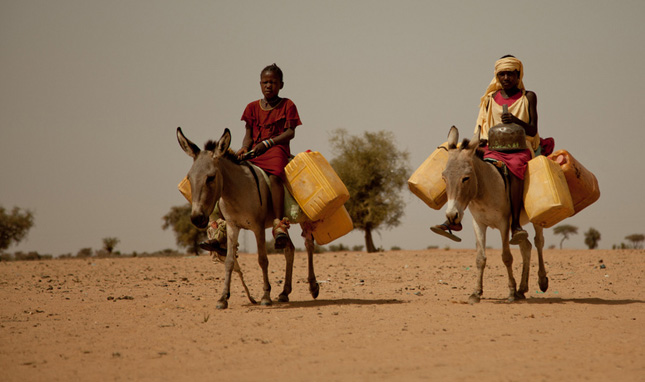-
The Melting Arctic Could Spur Even More Migration in the Sahel, But There Are Some Surprising Solutions
June 15, 2017 By Meaghan Parker
A new study published in the Proceedings of the National Academy of Sciences says that melting in Greenland could change ocean currents and cause unprecedented drought in Africa’s Sahel region, the Washington Post reported last week: “The consequence could be devastating agricultural losses as the area’s climate shifts. And in the most severe scenarios, tens of millions of people could be forced to migrate from the area.”
WaPo: “A climate chain reaction: Major Greenland melting could devastate crops in Africa”
A new study published in the Proceedings of the National Academy of Sciences says that melting in Greenland could change ocean currents and cause unprecedented drought in Africa’s Sahel region, the Washington Post reported last week: “The consequence could be devastating agricultural losses as the area’s climate shifts. And in the most severe scenarios, tens of millions of people could be forced to migrate from the area.”
This headline is more terrible news for the 135 million people who live in the Sahel region, a dry and arid band that stretches across northern Africa from Senegal to Sudan. The Sahel is already suffering a migration crisis that has displaced 5 million people. Farmers and herders struggle to feed their families during the increasingly severe droughts, while decades of political instability, ethnic conflicts, and poor governance prevent nations from ensuring security and development for their citizens. Throw in violent extremism, and the Sahel is a perfect storm of vulnerability, even before we reach the Arctic tipping point.
Look behind the headline with these resources from the New Security Beat:
- With some of the highest fertility rates in the world, the Sahel’s population may more than double by 2050: According to Roger-Mark De Souza, “many of these women would like to have access to reproductive health services, but are unable to access them because of distance, unavailability of materials they need, cultural taboos associated with these issues, women’s traditional roles, and the status of women in the Sahel.”
- Rapid population growth combines with resource scarcity to increase the potential for conflict in the Sahel. The New Climate for Peace report commissioned by the G7 Foreign Ministers warns that as the Sahel’s population grows, increasing their requirements for land and water, “the increasing variability of rainfall can feed into existing conflict dynamics and increase the potential for violent conflicts.”
- But tens of millions might not be forced to flee or fight: Climate-related migration is more complex than most people think, attests the authors of Navigating Complexity: Climate, Migration, and Conflict, who identify considerable misconceptions about why people move, how many move, and what effects they have. Some populations are too poor to move, while others find ways to adapt rather than abandon their homes.
- There are some surprising solutions: Whether we reduce emissions enough to avoid the Arctic tipping point, the Sahel can change its demographic future to better adapt to climate change and increase food security. “If we act now,” Malcolm Potts, the founder of the OASIS Initiative, recently said at the Wilson Center, “we could have a very significant effect.” OASIS’ large-scale integrated action plan includes voluntary family planning and education. “Another Sahel is possible,” said Nouhou Abdoul Moumouni, OASIS’ Program Director for Niger, “where a girl can be educated, to be free from early marriage, and women can be able to make their own reproductive choices. And mostly, where everyone can have enough to eat.”
Sources: Washington Post.
Photo Credit: Children riding donkeys outside of Kaedi in the south of Mauritania, courtesy of Pablo Tosco/Oxfam International.
 A Publication of the Stimson Center.
A Publication of the Stimson Center.



